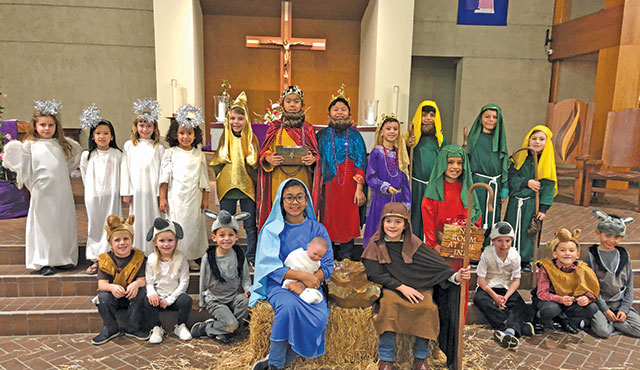Trish Novobilski has been a religious education instructor for more than 30 years, yet children still surprise and delight her with their innocence and understanding of God.
“It’s an amazing experience to allow a child to express how they see God in the world,” says Novobilski, a Mission Viejo resident and longtime faith formation instructor at San Francisco Solano Church in Rancho Santa Margarita.
As one of the hundreds of faith formation instructors and catechists who volunteer to teach religious education courses for children at the Diocese of Orange’s many parishes, she notes that “in a world that has so much negativity, it’s good to see the positive things that are going on with our kids.”
Jennie Fice, Solano’s elementary and sacramental preparation coordinator, says faith formation in their parish begins with toddlers and continues through high school. Each child has a Bible and learns how to use it, and children reflect upon Scripture every week.
“Above all else, our program is designed to make sure the children learn that they are loved,” Fice says. “They learn that God loves them to an extent beyond their comprehension, and they develop a deep personal relationship with Jesus.”
Like Solano, Saint Vincent de Paul Catholic Church in Huntington Beach uses the Catechesis of the Good Shepherd format for its faith formation classes. Rose Antognoli, the parish’s faith formation director, notes that the program uses Montessori teaching methods to teach children about Jesus and the Catholic faith.
“These days children and parents are really busy,” Antognoli observes. “We strive to create a sense of stillness allowing children to listen, time to reflect and absorb. Even the youngest children have the capacity to learn – and the Holy Spirit is the best teacher.”
In addition to worship, classes include games and activities for each age and discussions about different topics related to weekly Scripture, feast days, or lives of the saints.
Both parishes recruit catechists who express interest in sharing their Catholic faith. The best faith formation instructors have a strong religious and spiritual foundation, a deep prayer life, and enthusiasm for sharing their faith with others. Strong listening and observation skills are important, leaders say, because lessons are tailored to each child’s learning style.
“Our best teachers are able to pray with the children, to help them understand the faith, and to have great patience,” Antognoli says. Each volunteer instructor goes through specialized catechesis training before being assigned to a particular grade level. “We’re blessed to have a lot of teachers who have the heart for this work.”
Faith formation teachers don’t necessarily have to be the most pious people, agrees Fice, “but they need to have a love of the Lord. They also need to love children and be able to make their faith come alive for kids. The most important thing is that they have a heart for this. You can’t train people for that – it must be part of who you are as a person.”
In addition to their enjoyment of children, adds Amy Franklin, Solano’s director of faith formation, teachers must be welcoming and passionate about their faith, easy to approach, and open.
“They cannot be intimidated,” Franklin notes. “Leaders are never really alone in the classroom, because we provide the support and materials, as well as ongoing learning and training based on the needs of their specific classroom.” It’s a team approach, she adds. “We’re constantly reevaluating and checking in to see what’s working.
“We try to design every session to make sure every child’s learning style is met,” she adds. “We start each class with age-appropriate worship and then move on to the class setting. It’s a well-rounded process for students to feel they belong and are loved.”
While teachers receive an outline and learning objectives, they are encouraged to personalize their lessons. And, Fice and Franklin say, it’s also important for faith formation teachers to be open to learning from the children.
In addition to children’s faith formation classes, adult courses are available as well.
Parents support faith formation by reinforcing each week’s lesson. “They can ask their kids about what they learned, and pray with them,” Novobilski says. “Children learn more from our behavior than from what we say.
“Children have so much to give,” she notes. “Today’s lesson might be something like, ‘What did you do today to put a smile on Jesus’s face?’ And they will share things like, ‘I know my sister is having a hard time reading, so I’m trying to help her.’
“They may say, ‘I know my Mom and Dad work hard all day, so I clean up my room and do my chores, so they don’t have to nag me,’” she adds.
“They’re making a difference and they’re making the right choices.”

